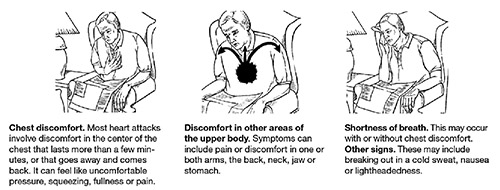

(Courtesy of SMGH) “I’m having chest pains and difficulty breathing. And I’m light-headed and feeling a bit nauseous. Looks like I’m coming down with COVID-19.”
Or are you? It is important to understand that some lung symptoms are also similar to those of heart problems—such as shortness of breath and chest discomfort—and do not always indicate COVID-19. These can indicate a serious heart problem that requires medical attention now! Don’t take any chances—call Hatzolah and get to the emergency room immediately!
February is National Heart Month, and it is important to be alert to heart problems—heart attack or cardiac arrest, especially now with everybody’s mind on COVID-19, which could lead to self-misdiagnoses.
Cardiac Arrest or Heart Attack?
Many people don’t know the difference between a cardiac arrest and a heart attack and use the two terms interchangeably. A heart attack occurs when blood flow to the heart is blocked. If the blocked artery is not reopened quickly, the part of the heart that is nourished and oxygenated by the blood flow from that artery begins to “die.” Symptoms of a heart attack can include intense discomfort in the chest, shortness of breath, nausea/vomiting, cold sweats and pain radiating to the jaw or arm.
Cardiac arrest, however, happens when the heart cannot effectively pump blood to the brain, lungs and other organs due to an arrhythmia, or irregular heartbeat. A person becomes unresponsive, loses their pulse and stops breathing. Irreversible death will occur within minutes if the victim does not receive immediate treatment. If you or a loved one is experiencing symptoms of a heart attack or cardiac arrest, call Hatzolah (or 911) immediately—the longer a person goes without treatment, the higher the damage.
About 325,000 people a year die of coronary attack before they get to a hospital or an emergency
room. But many of those deaths can be prevented—by acting fast! Some heart attacks are sudden and intense. But most start slowly, with mild pain or discomfort. Here are some of the signs that can mean a heart attack is happening:1
“St. Mary’s General Hospital is a state-designated heart center and certified stroke center,” said George Matyjewicz, PhD, community liaison. “In fact, our history shows that we pioneered the first open-heart surgery in New Jersey. And St. Mary’s General and our sister hospital, St. Michael’s in Newark, have had heart programs since the 1960s! Our parent organization, Prime Healthcare, has invested $65 million to improve St Mary’s with physical upgrades and the latest state-of-the art equipment and top-level physicians, focusing on the needs of our local patients.
“While we hope that you never have to come to our hospital for heart surgery,” said Matyjewicz, “if you do, you will be a proud owner of Sir Koff-A-Lot, the teddy bear that you hold to your chest when you cough after heart surgery. Like my wife, Phyllis—Perel bas Devorah—who had emergency double-bypass, open-heart surgery at St. Mary’s in December 2019. B”H, she is doing very well, and we continually praise and thank the physicians and staff at St. Mary’s for the excellent care!”
The quicker the patient comes to the ER the better chance we all have to help that patient and save their life. So, while COVID-19 may be all over the news today, and our community may be justifiably concerned, it doesn’t mean that other potentially life-threatening health concerns should be ignored.
St. Mary’s General Hospital—nationally recognized, locally preferred among the top hospitals in America for health, quality and patient safety! The hospital has over 550 physicians and 1,200 employees, with every staff member committed to providing respectful, personalized, high-quality care—to satisfy patients’ needs and exceed their expectations. St. Mary’s General is a proud member of Prime Healthcare, which has more Patient Safety Excellence Awards for five consecutive years (2016-2020) than any other health system in the country including a “Top 15 Healthcare System” by Truven Health Analytics. To learn more about St. Mary’s General Hospital visit https://www.smh-nj.com/ or Facebook at https://www.facebook.com/StMarysGeneral.
For more information, please contact George Matyjewicz, PhD, community liaison, at georgem@gapent.com.











